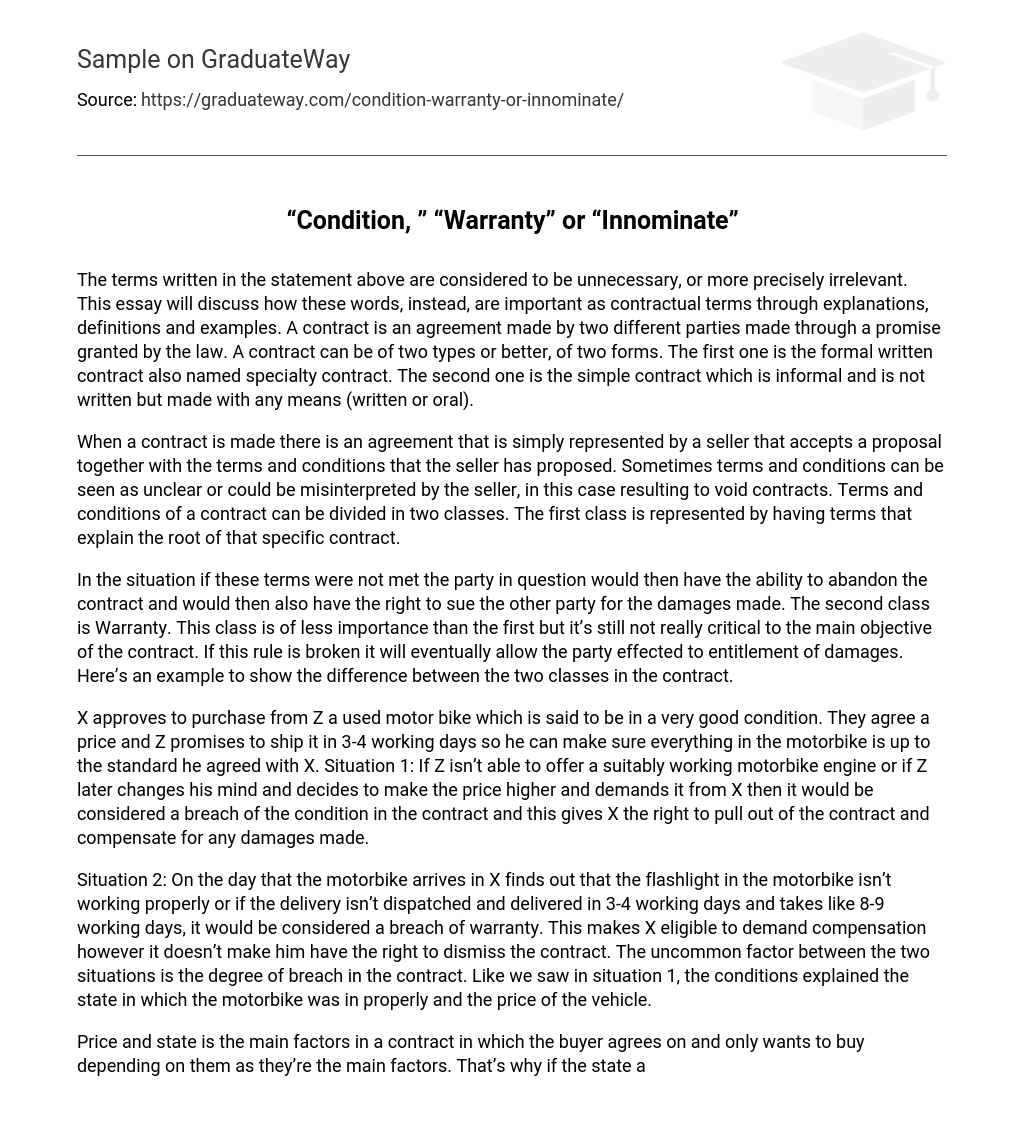The terms written in the statement above are considered to be unnecessary, or more precisely irrelevant. This essay will discuss how these words, instead, are important as contractual terms through explanations, definitions and examples. A contract is an agreement made by two different parties made through a promise granted by the law. A contract can be of two types or better, of two forms. The first one is the formal written contract also named specialty contract. The second one is the simple contract which is informal and is not written but made with any means (written or oral).
When a contract is made there is an agreement that is simply represented by a seller that accepts a proposal together with the terms and conditions that the seller has proposed. Sometimes terms and conditions can be seen as unclear or could be misinterpreted by the seller, in this case resulting to void contracts. Terms and conditions of a contract can be divided in two classes. The first class is represented by having terms that explain the root of that specific contract.
In the situation if these terms were not met the party in question would then have the ability to abandon the contract and would then also have the right to sue the other party for the damages made. The second class is Warranty. This class is of less importance than the first but it’s still not really critical to the main objective of the contract. If this rule is broken it will eventually allow the party effected to entitlement of damages. Here’s an example to show the difference between the two classes in the contract.
X approves to purchase from Z a used motor bike which is said to be in a very good condition. They agree a price and Z promises to ship it in 3-4 working days so he can make sure everything in the motorbike is up to the standard he agreed with X. Situation 1: If Z isn’t able to offer a suitably working motorbike engine or if Z later changes his mind and decides to make the price higher and demands it from X then it would be considered a breach of the condition in the contract and this gives X the right to pull out of the contract and compensate for any damages made.
Situation 2: On the day that the motorbike arrives in X finds out that the flashlight in the motorbike isn’t working properly or if the delivery isn’t dispatched and delivered in 3-4 working days and takes like 8-9 working days, it would be considered a breach of warranty. This makes X eligible to demand compensation however it doesn’t make him have the right to dismiss the contract. The uncommon factor between the two situations is the degree of breach in the contract. Like we saw in situation 1, the conditions explained the state in which the motorbike was in properly and the price of the vehicle.
Price and state is the main factors in a contract in which the buyer agrees on and only wants to buy depending on them as they’re the main factors. That’s why if the state and price isn’t accurate this would be considered a massive breach in the contract. In situation 2, where it is said that the motorbike is in a ‘’Very good condition’’ which means that it is a used motorbike but which isn’t harmed in anyway and all its features are working fine and the delivery time was shown as 3-4 days.
However even if these terms weren’t met and the flashlight wasn’t fully functional and it was delivered in 8-9 days instead of 3-4 days it wouldn’t considered a massive breach of contract like it is in situation 1 as it could be easily compensated. Such a situation wouldn’t result in the cancellation of the purchase as it wouldn’t be really worth it. So it would be considered a breach of warranty, not a breach of contract. In some rare events, the uncommon factors in a contract aren’t too expressive to fall under a category of either conditions or warranties.
As a result the court would organise a hearing that can allocate the situation to a neutral committee where it would be evaluated for consequences of breaching. Another example would be if after a month that X has been using the motorbike for it turned out that were many faults with the motorbike that weren’t evident before. The motorbike wouldn’t start sometimes so there might have been an issue with the engine. Meaning X will have to take it to a motorbike repair shop and it will cost him money to solve the issue.
X would then think about dismissing the contract and suing Z. Nevertheless terminating the contract wouldn’t be an option then and the only option Z would have is to claim damages from X. The reason why X couldn’t terminate the contract is because he wasn’t fully dispossessed of what he was promised for. The legal action of such breach would depend on the intention of the seller and classifying it under either condition or warranty, unless it was expressed clearly in he contract itself. If at the time of purchase if Z actually knew about the faults and bad condition the motorbike he was selling to X was in and still managed to sell the motorbike under a contract which showed otherwise. Then X would have the complete right to reclaim damages and terminate the contract. This is only acceptable because of the nature of the situation which showed that the breach happened while the seller was aware that he’s not meeting the contract terms.





